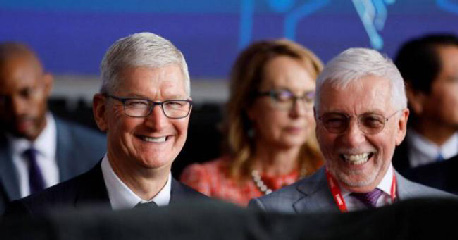![]()
Senior U.S. and European Union officials agreed to work closely to strengthen semiconductor supply chains, including sharing information on their respective programs of huge subsidies to boost homegrown chip production. But the two sides have failed to make progress in their dispute over plans for new electric vehicles in the United States.
Senior U.S. and European Union officials agreed to work closely to strengthen semiconductor supply chains, including sharing information on their respective programs of huge subsidies to boost homegrown chip production.
However, the two sides failed to make progress in their dispute over plans for new electric vehicles in the United States during a meeting on Monday to discuss trade and technology issues. The dispute has strained U.S.-EU relations, with French President Emmanuel Macron raising the issue during a meeting with U.S. President Joe Biden last week.
European officials said they would continue to press the United States to address their concerns in guidelines on how to implement relevant EV legislation, due to be rolled out on Jan. 1 next year.
The European Union and key U.S. allies in Asia say new electric vehicle subsidies introduced under the Inflation Reduction Act discriminate against their companies by requiring vehicles to be assembled in North America and regulating the content of related raw materials.
The officials met outside Washington for a ministerial meeting of the U.S.-EU Trade and Technology Council, or TTC, a forum established last year to promote key issues such as advanced technology, supply chains and climate policy. cooperation in the field. The commission is part of a bid by the Biden administration to strengthen ties with allies and friendly partners to counter Chinese influence.
U.S. representatives to the TTC include Secretary of State Antony Blinken, Commerce Secretary Gina Raimondo and U.S. Trade Representative Katherine Tai. The EU side is led by European Commission Executive Vice President Margrethe Vestager and Valdis Dombrovskis.
Although the dispute over electric vehicles cast a pall over the meeting, the two sides highlighted concrete achievements through the TTC framework, including an agreement on the semiconductor supply chain; Reliance on Asian suppliers.
Earlier this year, the United States passed the Chips Act, a $280 billion piece of legislation that provides subsidies and support for semiconductor research and development as a way to encourage companies to manufacture chips domestically. Similar legislation has been introduced in the European Union, raising concerns that global semiconductor companies could compete with each other for more favorable deals or create a supply glut in the long run.
To address this issue, the U.S. Department of Commerce and the European Commission agreed to establish a common mechanism to share information on public support programs, including relevant methodologies and best practices, and to build a common understanding of market dynamics.
The parties are also implementing an early warning mechanism aimed at responding to and mitigating possible disruptions to the semiconductor supply chain.
"Transparency is a key tool to avoid concerns about public support plans," the U.S. and EU said in a statement.
Monday's meeting comes as governments in Europe, South Korea and Japan are pressuring Washington to address their concerns about a U.S. electric vehicle subsidy program. After meeting with Macron last Thursday, Biden said that the United States could make adjustments to the Inflation Cutting Act. The bill provides subsidies for U.S. manufacturers and tax breaks for electric vehicles and other products assembled in North America. Any adjustments to the Act will be made to make it easier for European companies to participate in the scheme.
"We have heard clearly concerns from our European friends about some specific aspects of the legislation," Blinken said after Monday's meeting, adding that he believed there was a way forward.
“We also need to see what can be done in the implementation of the Inflation Cutting Act,” Vestager said. "But most importantly, the United States is fully engaged in fighting climate change."
Meanwhile, European Commission President Ursula von der Leyen said in a speech on Sunday that the bloc could adjust its own subsidy policy and consider new funding in response to the Inflation Cut Act.
Von der Leyen said the EU must "take action to rebalance the playing field where the Inflation Cut Act or other measures create distortions". The U.S. legislation risks unfair competition and fragmenting supply chains already tested by the pandemic, she said.
Von der Leyen raised the possibility of creating a European sovereign fund, which she said could support companies working on clean-tech innovations and other climate-related projects.
The Internal Revenue Service, which is part of the Treasury Department, has a deadline at the end of the year to come up with guidelines for tax and climate spending provisions in the Inflation Cut Act signed by Biden in August. , under what circumstances a business can qualify for an electric vehicle tax credit of up to $7,500 per vehicle.
While the Inflation Cut Act has laid out the gist of the tax break, foreign government officials and those in the auto industry have expressed hope that the U.S. Treasury Department will address some of their concerns with a flexible interpretation of the bill.
At Monday's meeting, the U.S. and Europe also unveiled a new roadmap that involves assessing artificial intelligence and related risks and developing common standards for charging systems for heavy-duty electric vehicles.
On export controls, the two sides agreed to launch a pilot program to determine how to streamline transatlantic trade in dual-use technology and more coordination in revising the list of restricted items.
Officials have also begun exchanging information on Chinese medical device companies and how Chinese investment funds are being spent, the U.S. and EU governments said, in an effort to better address China's non-market behavior.


